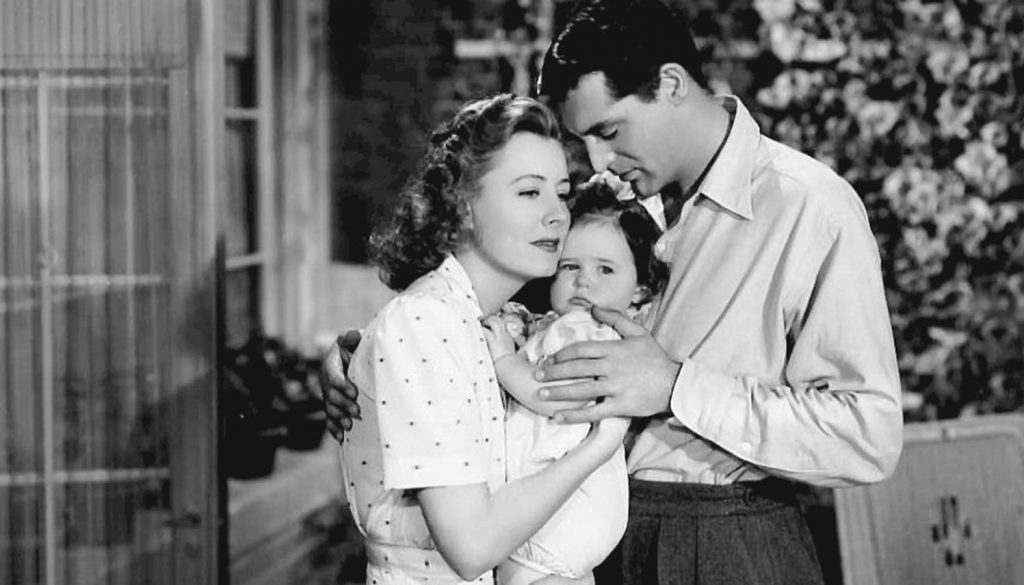In a world of massive streaming libraries, high-definition screens, and surround-sound systems, technology grants us the power to transform the living room into a miniature movie theater, featuring almost any of the latest and greatest films we can think of. The explosive adventure of “1917,” the impassioned dialogue of “Marriage Story,” the weirdness of “Tiger King,” and everything in between is right at our fingertips. If there’s any time to become a modern movie expert, it’s now.
But every so often, perhaps one feels the need for a reprieve from the overpowering CGI, modern cynicism, and overly violent or sexualized content that permeates the streaming world. In those moments, the simple elegance of a classic black-and-white drama might do the trick.
One in particular can make for an especially thought-provoking movie night: George Stevens’ “Penny Serenade” (1941), starring Cary Grant and Irene Dunne. This film, available on the free online streaming platform Kanopy, not only offers the nostalgia of a 1940s love story but is also an illustration of the growth, challenges, and lessons of love that can resonate with audiences today.
Even in their spiffy pre-war attire, Roger (Grant) and Julie (Dunne) resemble a 21st-century couple in their attitudes and actions. After a brief meeting that lights a spark between them, they frequent each other’s lives with pleasant trips to the seaside and the dance floor, but without any indications of commitment, that is, until Roger lands a job overseas and hastily proposes before leaving.
The two marry that very night, almost on a whim. After pushing through the first few bumps of marriage, they receive the tragic news of Julie’s miscarriage and inability to have children. They decide to adopt, but Roger’s floundering newspaper makes money tight and weakens the prospects of getting the judge’s approval to keep the child.
The film’s entire impetus is to show how Roger and Julie stumble, cope, and grow through the turbulent moments of life. The result is two timeless messages: that children can bring out the best in couples, and that family happiness does not depend on money.
Take the evolution of Roger’s character, which Grant executes with quintessential poise and energy. In the first half of the film, Roger relishes the present moment, with little thought to the future. Always eager for independence and control, marriage had not been a priority for him.
And when he does marry, he craves the high-class life and spends lavishly, often outside of his means. When it comes to having children, Roger is hesitant, but when he does agree to adopt, he insists he can only be happy with a boy with blue eyes.
The transformation after little Trina enters the scene is gradual yet palpable. As Roger and Julie fumble to learn how to care for a baby (in a string of hilarious scenes of bedtime and bathing), their priorities shift. Suddenly, their own ambitions and desires take a back seat. But instead of causing the flame of romantic love to die out, being parents actually fans that flame.
As the film progresses, we see that life with Trina ushers in the happiest moments Roger and Julie have ever known. It is with a 1-year-old Trina that they laugh and enjoy their apartment’s roof terrace together, and it is when an elementary-aged Trina cheerfully helps with Julie’s surprise birthday party that Roger delights his wife with the watch she always wanted.
Julie’s life as a mother propels her to shed her insecurities and uplift her family with confidence and affection. And when a penniless Roger appears before the judge to plead their adoption case, his speech constitutes one of the most heart-wrenching and powerful displays of fatherly love to appear on the silver screen.
Thankfully, “Penny Serenade” is no fairy tale. It is an unvarnished portrait of marriage throughout the peaks and valleys of life. At times, as many married couples might attest, the strain of hardship and the distance of fresh romance makes conversation dull and the home atmosphere chilly. Is such a condition reversible? Roger and Julie seem as uncertain as any inexperienced pair.
At their lowest points, the advice of modern culture might tell them that staying together, raising a family, and further stretching finances will only make matters worse. In contrast, this film offers the more hopeful message that children — and the generous outpouring of love they inspire — actually enhance a couple’s life together, bringing meaning and fostering virtue they never knew was possible.
For that, “Penny Serenade” is more than a pleasant throwback film; it is a tribute to the power of family love. Watching it will remind viewers that even in the most bitter of circumstances, when being alone seems to be the only solution, we all yearn for and depend upon the gift of family, which can always give life meaning and keep hope alive.

